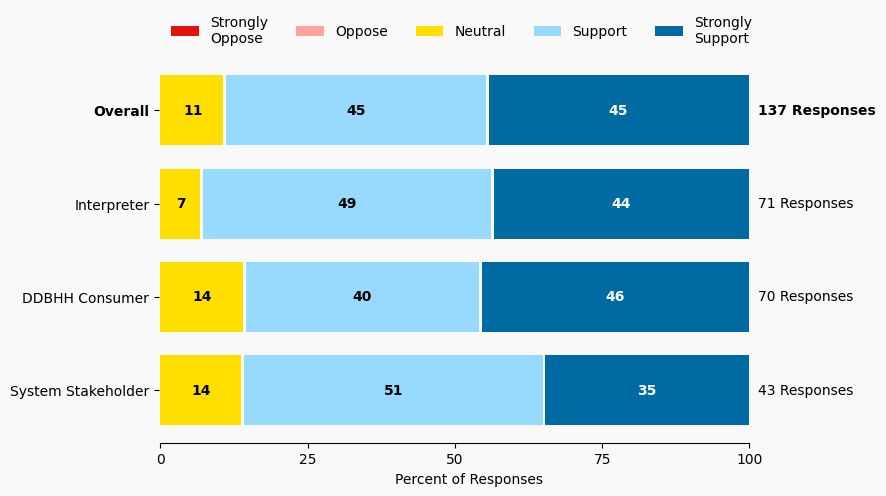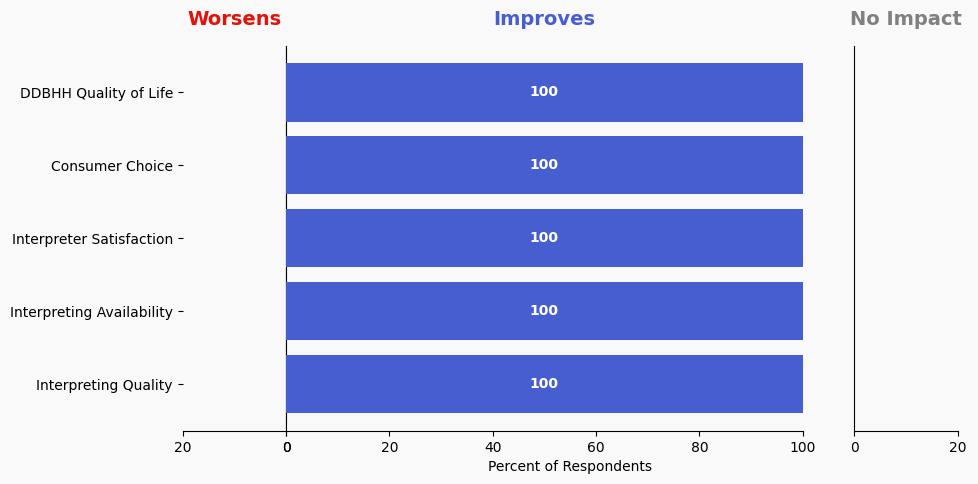36 Centralize Information about Community Gatherings
Issue: Information about social gatherings for interpreters and DDBHH community members is spread out. Not all people know where to find opportunities for social gatherings.
Proposed Solution: Commission centralize and publicize information about community activities. There are many opportunities that already exist but may be difficult for all interested parties to find and plan for community events. Camp ASL, ASL Night Out, Charles Thompson Hall, MDS community events, etc.
Expected outcome: Prospective interpreters’ ASL skills will increase. Stronger relationships developed among DDBHH and interpreting communities.
Who is impacted: Interpreters, consumers
Timeline: 6 months

Summary of Support Image Description
The stacked bar charts show how respondents rated their level of support and the total number of responses. The percentage for the five support levels is shown from left to right: Strongly Oppose (Dark Red), Oppose (Light Red), Neutral (Yellow), Support (Light Blue), and Strongly Support (Dark Blue).
Respondents may identify with multiple subgroups. The overall level of support is:
Overall
Strongly Oppose: 0%
Oppose: 0%
Neutral: 11%
Support: 45%
Strongly Support: 45%
Click to see the detailed image description for each subgroup.
Interpreter
Strongly Oppose: 0%
Oppose: 0%
Neutral: 7%
Support: 49%
Strongly Support: 44%
DDBHH Consumer
Strongly Oppose: 0%
Oppose: 0%
Neutral: 14%
Support: 40%
Strongly Support: 46%
System Stakeholder
Strongly Oppose: 0%
Oppose: 0%
Neutral: 14%
Support: 51%
Strongly Support: 35%
Overview of Respondents Opting for In-Depth Solution Analysis
After indicating their support level, 1% of the 137 respondents opted in to further assess whether the solution would worsen or improve on five metrics. Of the opt-in reviewers (2 respondents), 100% supported the solution, 0% were neutral on the solution, and 0% opposed the solution.
The remaining 135 respondents did not opt in to further assess the solution. Of these people, 88% support the solution, 11% were neutral on the solution, and 0% opposed the solution.
Reviewer Evaluation of Solution Effectiveness

Solution Effectiveness Image Description
The stacked bar charts show how respondents assessed the effectiveness of this solution based on five metrics. For each metric, the percentage of respondents is shown from left to right: Worsens (Red), Improves (Blue), No Impact (Gray).
DDBHH Quality of Life
Makes It Worse 0%
Makes It Better 100%
No Impact 0%
Interpreter Satisfaction
Makes It Worse 0%
Makes It Better 100%
No Impact 0%
Consumer Choice
Makes It Worse 0%
Makes It Better 100%
No Impact 0%
Interpreting Availability
Makes It Worse 0%
Makes It Better 100%
No Impact 0%
Interpreting Quality
Makes It Worse 0%
Makes It Better 100%
No Impact 0%
Reviewer Feedback and Insights
Interpreter
Comments from Interpreters suggest that a centralized website for community gatherings would be useful, with some noting that MRID may already offer a similar resource. Suggestions include creating a platform managed by the community, and a clearinghouse website for events, performances, and more, though concerns were raised about its impact on interpreting outcomes.
Deaf, DeafBlind, Hard of Hearing
No comments were submitted.
System Stakeholder
No comments were submitted.
PREVIOUS SOLUTION
35 Accredit Interpreter Referral Companies
Issue: Multiple concerns have been raised about interpreter referral company practices. There is no standardization of interpreter referral companies nationwide nor statewide. While RID and NAD have each discussed and held groups to work on developing standards, such as a Code of Professional Conduct, Better Business Bureau ratings or similar system for providing guidance to interpreter referral companies, no such systems or guidance exist.
NEXT SOLUTION
Issue: There are interpreting needs that are not currently covered by the ADA, such as for small businesses or community organizations for which paying for interpreters would be an undue hardship. Another applicable situation is when the deaf, deafblind and hard of hearing consumers themselves become the host, such as for a wedding or personal gathering.
Leave a Reply